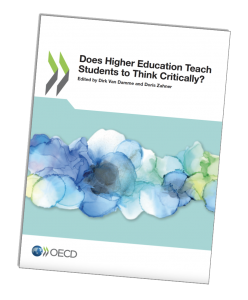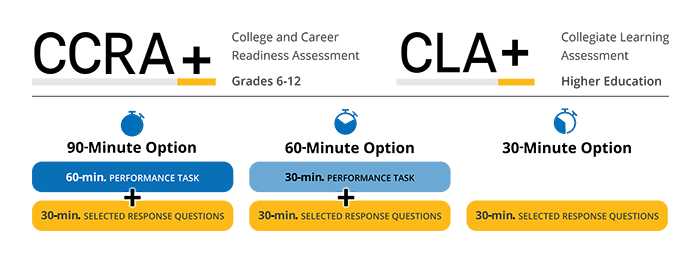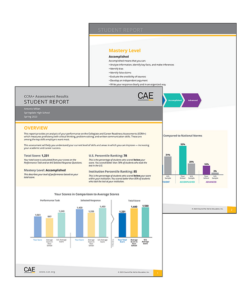
A growing trend among employers is their need for candidates to have strong higher-order skills, including critical thinking, problem solving, and written communication. This means that K–12 schools and higher education institutions should be helping students develop these skills while they attend school so they are prepared for the future .
Critical thinking assessments are one component in helping students develop these higher-order skills. Critical thinking assessments identify students’ strengths and areas for improvement. This information helps educators provide tailored instruction to help students grow and become proficient with future-ready skills.

There is a growing gap between the qualifications students acquire at colleges and universities around the world and the skills employers are seeking. Often known as “soft skills” or “higher-order skills,” they include things like critical thinking, communication, problem solving, adaptability, resilience, and flexibility.
A global survey conducted by McKinsey in 2020 found that 90% of executives and managers either already saw skills gaps in their organizations or expected those gaps to develop soon. A six-year international research study conducted by the Council for Aid to Education (CAE) and the Organization for Economic Co-operation and Development (OECD) found that 60% of students entering colleges and universities are not proficient in higher-order skills and 44% of exiting students are still not proficient. Yet, these skills are predictive of positive future outcomes in terms of employment for graduates. This worrying trend is becoming a severe issue in many countries, compromising productivity, growth, and even the success of businesses. In that same McKinsey study, nine out of ten executives and managers said that workforce skills gaps are, or will soon be, a risk to the success of their organization.

Literacy and critical thinking skills that include problem solving, analytic reasoning, and communication topped the list of skills college graduates haven’t developed — which means high school graduates haven’t built these essential skills either. Companies prioritize these skills, along with decision making, leadership, adaptability, and continuous learning.

Content knowledge alone is not sufficient for job candidates in today’s workforce. The job market is constantly evolving and, as a result, new careers are emerging that require a different set of skills than traditional jobs. A 2021 study by Gartner estimated that 33% of the skills listed in a typical job description in 2017 were almost obsolete by 2021.
Careers of the future are likely to require a combination of technical and higher-order skills including creativity, critical thinking, communication, and adaptability.
Research shows that students who have developed higher-order skills are more likely to have:

The good news is that higher-order skills can be measured and taught. “Assessing and Developing Critical-Thinking Skills in Higher Education” , published in the European Journal of Education Study, shared key findings of the international study conducted by CAE and OECD including that it is feasible to reliably and validly measure higher-order skills in a cross-cultural context and that assessment of these skills is necessary for colleges and universities to ensure that their programs are graduating students with the skills needed for career success after graduation.
120,000 students from higher education institutions in six different countries — Chile, Finland, Italy, Mexico, the UK, and the US — were administered CAE’s Collegiate Learning Assessment (CLA+) between 2015 and 2020. This performance-based assessment is designed to measure proficiency with critical thinking, problem solving, and written communication. Analysis of the data show that students entering a higher education program on average performed at the Developing mastery level of the test while exiting students on average performed at the Proficient mastery level. The amount of growth is relatively small (d = 0.10), but significant.
CAE’s performance-based critical thinking assessments authentically measure the essential academic and career readiness skills of critical thinking, problem solving, and effective written communication, The assessments situate students in real-world scenarios that require the application of critical thinking, problem-solving, and written communication skills. Using supplied reference materials, students must organize information, define the problem, address issues, consider and evaluate solutions, and recommend and defend a course of action.
Student scores reflect a range of plausible and effective response strategies — a process that, by design, mimics real-world, decision environments.
CAE’s suite of performance-based assessments include the College and Career Readiness Assessment (CCRA+) for secondary education and the Collegiate Learning Assessment (CLA+) for higher education. These assessments measure student proficiency in critical thinking, problem solving, and written communication — skills that are predictive of positive academic and career success.


The resulting data can be used for formative and summative purposes, including evaluating how well students have developed essential skills at the beginning and/or end of a particular class or academic year, or to measure growth over multiple years.
Detailed student and institution-level reports can be used to:
In addition to performance-based critical thinking skills assessments, CAE offers instructional materials, practice models, and professional development that give educators the tools and data needed to develop courses, programs, and supports to improve their students’ higher-order skills and prepare them for success after graduation.
Our critical thinking assessment tools are based on over 20 years of research and use and are aligned to current assessment models, peer-reviewed research, and educational best practices. Read more about the research behind our critical thinking assessment here .